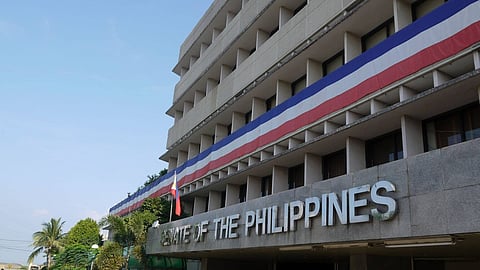
- NEWS
- the EDIT
- COMMENTARY
- BUSINESS
- LIFE
- SHOW
- ACTION
- GLOBAL GOALS
- SNAPS
- DYARYO TIRADA
- MORE

The Senate of the Philippines approved 39 proposed measures on third and final reading during its plenary session on Monday, 9 June 2025 — including several priority bills identified by the Legislative-Executive Development Advisory Council (LEDAC).
Among the national measures passed are the Amendments to the Right-of-Way Act, the Anti-POGO Act, the Judiciary Fiscal Autonomy Act, the Philippine National Nuclear Energy Safety Act, the Denatured Alcohol Tax Act, the Revised Philippine Coast Guard Law, the Virology Institute of the Philippines Act, the Declaration of a State of Imminent Disaster Act, and the Career Progression System for Public School Teachers and School Leaders Act.
The chamber also approved a series of local bills concerning franchises, the establishment and conversion of hospitals and schools, the creation of barangays, and the declaration of local holidays.
Among the local measures passed were House Bill No. 6013 establishing Barangay Pulung Bulu in San Fernando, Pampanga; HBN 5555 creating Barangay Friendship Village Resources in Norzagaray, Bulacan; and HBN 11189 renaming Barangay New Alabang Village in Muntinlupa City to Barangay Ayala Alabang — aligning the barangay’s official name with how the area is commonly referred to by residents.
The Senate likewise approved HBN 4839, a bill commemorating the charter anniversary of Lapu-Lapu City, Cebu.
Among the session’s most closely watched measures was Senate Bill No. 2868, or the proposed "Anti-POGO Act," which bans offshore gambling in the Philippines. Sponsored by Senator Win Gatchalian, the bill prohibits the establishment and operation of Philippine Offshore Gaming Operators (POGOs) in the country, along with penalties for those who aid or abet them.
The Senate also gave final approval to Senate Bill No. 2999, the "Declaration of State of Imminent Disaster Act," sponsored by Senate President Pro Tempore Jinggoy Estrada. The measure allows the President or local chief executives to declare a State of Imminent Disaster, based on the recommendation of the National Disaster Risk Reduction and Management Council (NDRRMC), enabling earlier mobilization of national and local resources to mitigate forecasted hazards.
Monday’s voting marked the completion of the Third Reading — the final step in the legislative process in the Senate. Here is a brief look at how bills progress through the chamber:
First Reading: A bill is filed, numbered, and read on the floor, then referred to the appropriate committee.
Committee Hearings: Committees hold hearings and consult stakeholders. They may approve, amend, or consolidate the bill.
Second Reading: The bill returns to the floor, where it undergoes debate, interpellation, and amendment before senators vote.
Third Reading: Senators receive the bill’s final version and cast a nominal vote. If passed, the bill is sent to the House of Representatives.
The House follows the same three-reading process. If differences arise between the Senate and House versions, a Bicameral Conference Committee reconciles them. The final reconciled version is then sent to the President for approval or veto.
